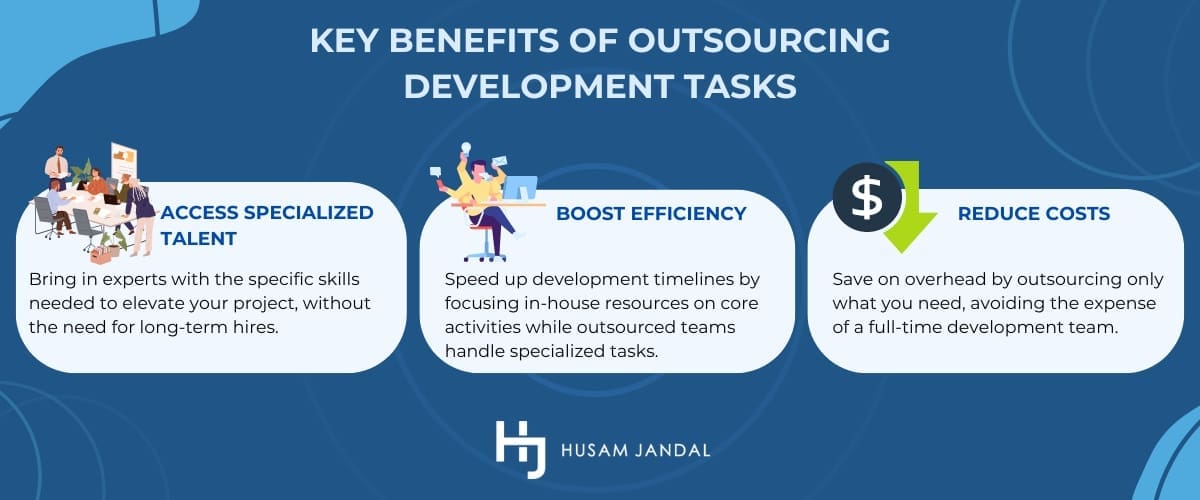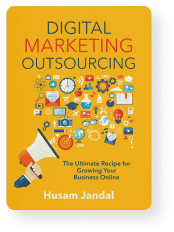
I’ve been speaking a lot about outsourcing lately and whether specific digital marketing roles are better served by an in-house member of your team or if you can hire an outsourcing company and get the same or better results. One area people don’t always group in with their digital marketing is development projects, such as your company’s app or website.
They think of development as its own category or an aside from what they’re already doing. The reality is, your apps, websites, and similar projects really are part of your digital marketing efforts. When they’re done well, they’re strong tools that can help you attract an audience, build relationships, and create sales. They’re digital marketing powerhouses. But, you will need to have enough resources, office space, and a strong infrastructure to be able to support the development on your own. A lack of expertise in the in-house team can lead to extra costs and time delays.
So, the question is do you need to hire a developer as part of your in-house team for these types of projects, or should you try outsourcing app development to a vendor? Let’s take a look.
Become Familiar with a Developer’s Role Before You Decide
Development is a broad term with a multitude of specializations. A few common examples include:
Mobile Application Development: The mobile app development process involves specific skills. It involves creating the codes that make up apps used on mobile devices, including phones and tablets. Some specialize in specific operating systems. This includes iOS app development or Android app development, and others.
Front-End Development: Front-end developers, also called client-side developers, are focused on the user interface (UI design) and user experience (UX) aspects of a build. They’re experts in creating fluid web layouts that people can use intuitively and help both the user and the company achieve their respective goals. They also spend a fair amount of time ensuring people have a good experience across multiple browsers, operating systems, and devices.
Back-End Development: Also referred to as a server-side developer, a back-end developer is concerned with the internal workings of a project. To give some context, when you use something like Google, the portions you’re clicking on and the box you’re typing in are designed by a front-end developer. It’s the back-end development team that created the engine itself—the portions that know what to look for and decide which results you’re going to see.
Full-Stack Development: A full-stack developer covers both front-end and back-end development tasks. He or she can create an entire website or app from scratch alone.
Consider the Resources and Core Competencies Necessary to Fulfill the Role
Skills
- Proficiency in multiple programming languages
- Comfort with data structures and algorithms
- Source control
- Data analysis
- Database knowledge
- At least a basic level understanding of networking
- Comfort with AI and automation
- Testing
- Problem Solving
- Communication
- An understanding of your brand, customers, and objectives
- And More
Tools
- Integrated developer environments (IDEs)
- Code review and management
- Code debugging and editing
- Testing
- Analytics
- Collaboration
- And More
Time
The amount of time a developer needs to complete a project will vary greatly from one task to the next. For example, a good developer can customize a pre-built website or application in less than a day, provided you’re only looking for basic edits.
Companies with greater customization needs, such as a startup, and those that need something built completely from scratch to suit their needs will naturally require much more time. However, the investment could be anything from days to years, depending on the specifications.
Having an outsourced team of professionals who know how to leverage project management platforms and tools such as agile methodology to stay within your schedules and timelines while increasing flexibility and aiming for continuous improvements. This can produce the high-quality software products your company desires.
Identify What Successful Development Looks Like to Your Organization
Successful development usually means meeting or exceeding expectations in three core areas; quality, effectiveness, and productivity. However, the KPIs your organization uses to measure success will vary based upon your goals and long-term strategy. A few examples are highlighted below.
KPIs
- Milestones met on time
- Percent to completion of a project
- Lines of code delivered
- Number of dual-purpose solutions created
- Number of bugs reported and/or eliminated
- Number of issues and/or critical issues solved
- Comprehensiveness of documentation
Making the Final Decision: Should You Outsource Apps and Other Development Tasks or Keep Them In-House?

As you can see, there’s complexity in application development, both in terms of the physical creation, as well as in the management of the projects. However, most companies don’t have a lot of ongoing development work. Once the “bones” are created, it’s more a matter of maintenance and keeping things fresh.
Benefits of Outsourcing Software Development
Bringing in a team from a software development company, or even a single individual, is almost always overkill for a one-off project, but will often bring down the overall app development costs if you’re working on multiple projects. It’s usually better to outsource development because you can bring in an app development team that is already familiar with each other’s individual talents, works fluidly together, and is familiar with a variety of companies and goals.
They’re more likely to keep up with trends and best practices as well, simply because they have to keep their skills sharp to continue working on the development and launch of new projects. This means they’ll be more efficient, and you’ll likely receive a better product overall.
Build Your Digital Marketing Dream Team
Getting the right people with the right expertise in place and knowing how to create an efficient and effective team structure is the foundation of successful digital marketing. However, chances are your organization doesn’t specialize in marketing—it’s something that you do in order to grow your business.
The good news is, digital marketing is what I do. As a business and marketing expert with decades of experience that includes everything from teaching at a university level through educating Google Partners and helping countless companies develop and implement their custom road maps to success, I have the insight to help you get the right people and processes in place to strengthen your business too. Contact me for a consultation.






































































